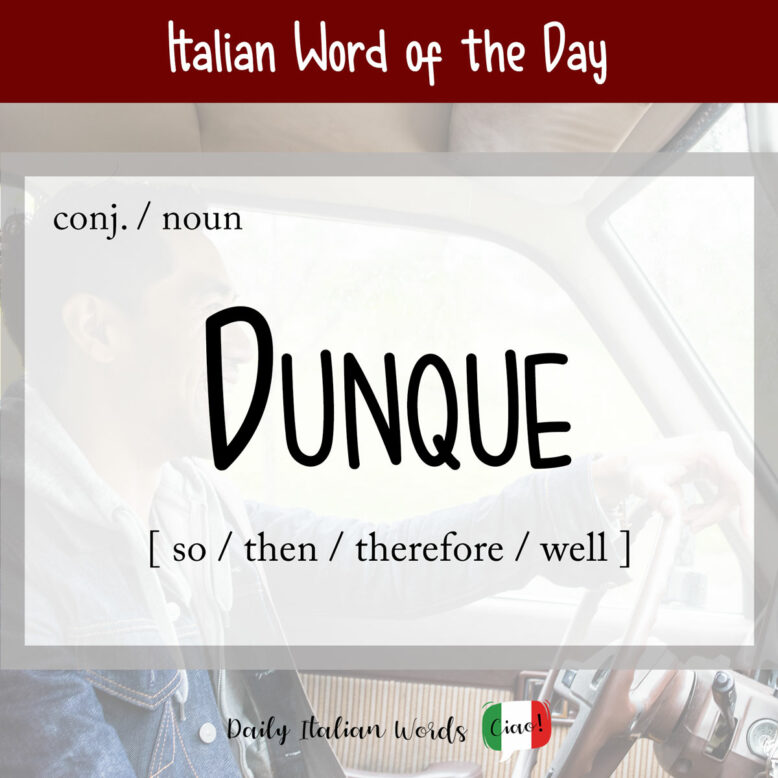Today we’re going to be investigating a lovely word that every learner of Italian should master – dunque – which translates to so, then, therefore or well depending on the surrounding context.
dunque
so / then / therefore / well

Dunque comes from the Vulgar Latin *dunquam, which is a cross of the Vulgar Latin dunc and Latin unquam (meaning “ever”).
In its most basic form, dunque is a conjunction used to introduce a consequence, much like the words therefore and so in English. For example:
Penso, dunque esisto.
I think, therefore I am.
Hai sbagliato, dunque devi pagare.
You made a mistake, so you must pay.
A defensive phrase you’ll often hear in everyday Italian is E dunque?, which is similar to the English So what?, What’s it to you? or What’s the big deal? It’s synonymous with the phrase E allora? or E quindi?
Sì, sono stato io a mangiare tutta la torta. E dunque?
Yes, I was the one who ate all the cake. So what?
Despite being defined as a conjunction in most dictionaries, it is far more common for dunque to be used as an adverb whose purpose is to add emphasis to a phrase, or resume a previous topic of conversation, much like the words so, then and well in English. Consider the following examples:
Dunque, dove andiamo?
Dove andiamo dunque?
So, where are we going? / Where are we going, then?
Su, dunque – non perdiamo tempo.
Come on, then – let’s not waste time.
Dunque, come dicevamo prima, l’italiano non è difficile per gli spagnoli.
Well, as we were saying, Italian isn’t difficult for Spaniards.
Colloquially, dunque is frequently used to gain a few extra seconds to think before responding to a question, starting a conversation, or beginning a speech.
Dunque… prima di tutto vorrei ringraziarvi per essere qui.
So… first of all I would like to thank you all for being here.

So far, we’ve seen the usage of dunque as a conjunction and adverb, but did you know that it also functions as an invariable noun with the meaning of point or crux? Used in this way, it almost always appears in the set expression venire al dunque, which means to get to the point.
Dai, vieni al dunque!
Come on, get to the point!
You may also hear the alternatives andare al dunque (literally “to go to the point”) and arrivare al dunque (literally “to arrive at the point”), both of which mean the same thing as venire al dunque.
Another common expression is Eccoci al dunque! which means Here we are at the turning point!
Heather Broster is a graduate with honours in linguistics from the University of Western Ontario. She is an aspiring polyglot, proficient in English and Italian, as well as Japanese, Welsh, and French to varying degrees of fluency. Originally from Toronto, Heather has resided in various countries, notably Italy for a period of six years. Her primary focus lies in the fields of language acquisition, education, and bilingual instruction.


